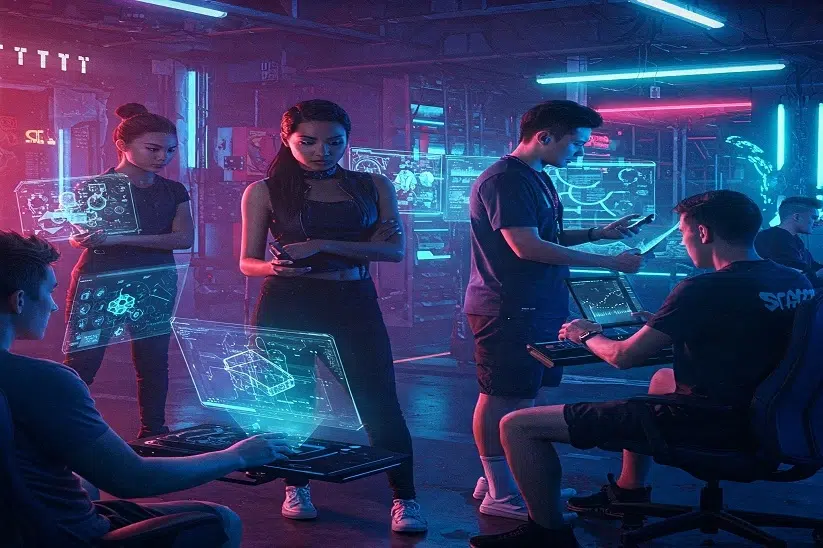The gaming industry has always been a hotbed for innovation, but a new wave of startups is accelerating change like never before. DefStartup Tech Gaming represents the fusion of cutting-edge technology, entrepreneurial spirit, and gaming culture—ushering in a new era of immersive, accessible, and player-driven experiences.
In this deep dive, we’ll explore what DefStartup Tech Gaming entails, the key technologies driving it, emerging trends, challenges, and what the future holds.
Understanding DefStartup Tech Gaming
DefStartup Tech Gaming refers to early-stage companies leveraging breakthrough technologies to disrupt traditional gaming models. Unlike established gaming giants, these startups prioritize agility, niche solutions, and rapid experimentation. Their focus areas include:
-
Cloud & Streaming Gaming (eliminating hardware barriers)
-
AI & Procedural Content Generation (automating game design)
-
Blockchain & Play-to-Earn (P2E) (enabling player-owned economies)
-
VR/AR & Metaverse Integration (blending physical and digital worlds)
-
Esports & Fan Engagement Tools (enhancing competitive gaming ecosystems)
These startups often emerge from indie developer communities, tech incubators, or blockchain ventures, bringing fresh perspectives to an industry historically dominated by a few major players.
Read More : poorvika mobiles gul
Key Technologies Reshaping Gaming Startups
1. Cloud Gaming: Gaming Without Boundaries
Startups like Parsec, Shadow, and Loudplay are decoupling gaming from hardware limitations by offering high-fidelity streaming. Advances in 5G and edge computing reduce latency, making cloud gaming viable for competitive play.
Why It Matters:
-
Democratizes access to AAA games for low-end devices.
-
Enables instant play without downloads (Netflix for games).
Challenges:
-
Internet infrastructure disparities in developing regions.
-
Licensing battles with traditional publishers.
2. AI-Driven Game Development
Artificial intelligence is transforming how games are made and played:
-
Procedural Generation: Startups like Promethean AI automate level and asset creation.
-
Dynamic NPCs: AI-powered characters (e.g., Inworld AI) adapt to player behavior.
-
Automated Testing: Tools like Modl.ai streamline QA processes.
Impact:
-
Reduces development time and costs for indie studios.
-
Enables infinitely replayable, personalized experiences.
3. Blockchain & Decentralized Gaming
Blockchain startups are redefining ownership and monetization:
-
Play-to-Earn (P2E): Games like Axie Infinity let players trade in-game assets as NFTs.
-
Decentralized Platforms: The Sandbox and Decentraland offer player-governed virtual worlds.
Controversies:
-
Environmental concerns (Proof-of-Work blockchains).
-
Regulatory uncertainty around NFTs and crypto.
4. VR/AR and the Metaverse Push
While Meta (Facebook) dominates headlines, startups are pioneering niche applications:
-
Social VR: Platforms like Rec Room focus on community-driven experiences.
-
AR Gaming: Startups like Niantic (Pokémon GO) blend real-world exploration with gameplay.
Barriers:
-
High hardware costs limit mass adoption.
-
Motion sickness and usability challenges persist.
5. Esports & Streaming Innovations
Startups are enhancing competitive gaming ecosystems:
-
Analytics Tools: Mobalytics and Grid provide player performance insights.
-
Low-Latency Streaming: Maincast reduces broadcast delays for tournaments.
-
Fan Engagement: Stake.com integrates betting and interactive viewing.
Read More: mat6 tube
Challenges Facing Gaming Startups
Despite their potential, DefStartup Tech Gaming ventures face hurdles:
-
Funding & Sustainability
-
Venture capital is cautious due to high risk (e.g., crypto gaming’s volatility).
-
Many rely on crowdfunding (Kickstarter) or token sales.
-
-
Market Saturation
-
Thousands of indie games launch yearly; discoverability is a struggle.
-
-
Technological Limitations
-
Cloud gaming requires robust infrastructure.
-
VR remains niche due to cost and comfort issues.
-
-
Regulatory Risks
-
Blockchain games face scrutiny over gambling and securities laws.
-
The Future Outlook
By 2030, DefStartup Tech Gaming could enable:
-
AI-Generated Games: Customized narratives based on player preferences.
-
Cross-Platform Metaverses: Interconnected virtual worlds (e.g., Fortnite x Roblox collaborations).
-
Mainstream Web3 Gaming: Regulated, eco-friendly blockchain integrations.
-
Neurogaming: Brain-computer interfaces (BCIs) for immersive control.
Final Thoughts
DefStartup Tech Gaming is more than a trend—it’s a paradigm shift. By merging entrepreneurship with emerging tech, these startups are making gaming more inclusive, interactive, and innovative. For developers, investors, and players, understanding this space is key to riding the next wave of digital entertainment.
Read More : dgmnews.com
FAQs
1. How do gaming startups compete with giants like EA or Ubisoft?
They focus on niches (e.g., hyper-casual mobile games, blockchain integration) or innovate in underserved areas (cloud gaming, AI tools).
2. Are blockchain games a fad?
While speculative hype has cooled, the underlying tech (digital ownership, decentralized economies) has long-term potential if scalability and regulation improve.
3. What’s the biggest barrier to VR gaming adoption?
Cost and comfort. Standalone headsets (Meta Quest) are improving, but widespread adoption needs cheaper hardware and killer apps.
Read Also :


